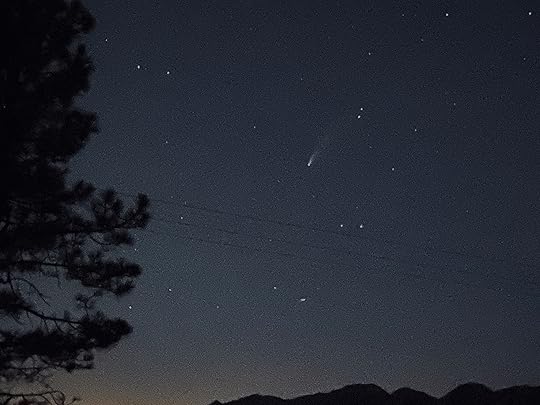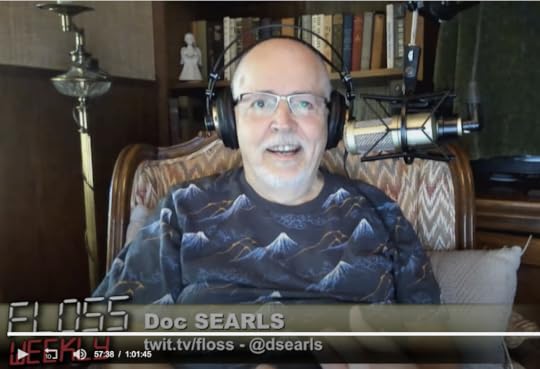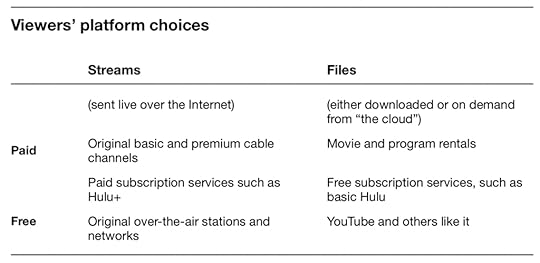Doc Searls's Blog, page 40
August 4, 2020
Time for advertising to call off the dogs

Is this the way you want your brand to look?
Digital advertising needs to sniff its own stench, instead of everybody’s digital butts.
A sample of that stench is wafting through the interwebs from the Partnership for Responsible Addressable Media, an ad industry bullphemism for yet another way to excuse the urge to keep tracking people against their wishes (and simple good manners) all over the digital world.
This new thing is yet another granfalloon conjured by the Association of National Advertisers, a granfalloon itself, and announced today, in the faux-news style of the press release (which it no doubt also is) at the first link above. It begins,
AD INDUSTRY LAUNCHES “PARTNERSHIP FOR RESPONSIBLE ADDRESSABLE MEDIA” TO ENSURE FUTURE OF DIGITAL MEDIA FOR BUSINESSES & CONSUMERS
Governing Group of Industry Leaders Includes 4A’s, ANA, IAB, IAB Tech Lab, NAI, WFA, P&G, Unilever, Ford, GM, IBM, NBCUniversal, IPG, Publicis, Adobe, LiveRamp, MediaMath, The Trade Desk
NEW YORK (August 4, 2020) — Leading trade associations and companies representing every sector of the global advertising industry today joined together to launch the Partnership for Responsible Addressable Media, an initiative to advance and protect critical functionalities like customization and analytics for digital media and advertising, while safeguarding privacy and improving the consumer experience. The governing group of the Partnership will include the most influential organizations in advertising.
I learned about this from @WendyDavis, who wrote this piece in MediaPost. NiemanLab summarizes the news in a tweet that reads, “A new ad-industry group will lobby Google and Apple to let them track users just a wee bit more, please and thank you.”
Writes Wendy,
The group will soon reach out to browser developers and platforms, in hopes of convincing them to rethink recent decisions that will limit tracking, according to Venable attorney Stu Ingis, who will head the legal and policy working group.
“These companies are taking huge positions that impact the entire economy — the entire media ecosystem — with no real input from the media ecosystem,” Ingis says.
As if the “entire media ecosystem” doesn’t contain the billions of humans being tracked.
Well, here’s a fact: ad blocking, which was already the biggest boycott in world history five years ago, didn’t happen in a vacuum. Even though ad blockers had been available since 2004, use of them didn’t hockey-stick until 2012-13, exactly when adtech and its dependents in publishing gave the middle finger to Do Not Track, which was nothing more than a polite request, expressed by a browser, for some damn privacy while we go about our lives online. See this in Harvard Business Review:
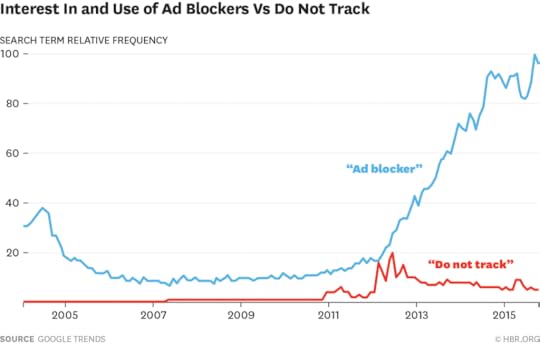
Here’s another fact: the browser makers actually care about their users, some of whom are paying customers (for example with Apple and Microsoft). They know what we want and need, and are giving it to us. Demand and supply at work.
The GDPR and the CCPA also didn’t happen in a vacuum. Both laws were made to protect citizens from exactly what adtech (tracking based advertising) does. And, naturally, the ad biz has been working mightily to obey the letter of those laws while violating their spirit. Why else would we be urged by cookie notices everywhere to “accept” exactly what we’ve made very clear that we don’t want?
So here are some helpful questions from the world’s billions to the brands now paying to have us followed like marked animals:
Have you noticed that not a single brand known to the world has been created by tracking people and aiming ads at them—even after a $trillion or more has been spent on that?
Have you noticed that nearly all the world’s major brands became known through advertising that not only didn’t track people, but sponsored journalism as well?
Have you noticed that tracking people and directing personalized messages at them is in fact direct marketing, which we used to call junk mail ?
Didn’t think so.
Time to get the clues, ad biz. Brands too.
Maybe start with The Cluetrain Manifesto, which says, if you only have time for one clue this year, this is the one to get…

That year was 1999.
If ya’ll had bothered to listen back then, you might not be dealing today with the GDPR, the CCPA, and the earned dislike of billions.
But it’s never too late. (Well, maybe it is, but for now let’s pretend it’s not.)
Maybe, after reading Cluetrain, you can also learn (or re-learn) the difference between real advertising and the junk message business. Find that lesson in Separating Advertising’s Wheat and Chaff. Also in the pretty much everything Bob Hoffman‘s been saying for decades—and better than I’ve been putting it here.
Bottom line: wake up and sniff your own stench.
August 1, 2020
Vermont Public Radio rating wins, and the future of streaming & podcasting

Radio is moving from these to servers of streams and podcasts.
Public Radio: What is the best NPR station in the country? That’s a question on Quora I thought needed answering. So I did, with this:
Here’s a quantitative answer to your qualitative question: WVPS of Vermont Public Radio. Because, in Nielsen’s Audio Ratings, it scores a 12.6 in its home market of Burlington, and a 16.2 in its neighbor market of Montpelier-Waterbury. Far as I know, those are tops among all the country’s NPR-affiliated stations.
Honorable mentions go to WUOM in Ann Arbor with a 13.0, KCLU in Santa Barbara with a 10.2—plus others you’ll find if you follow the links in Where Public Radio Rocks, which I published in April of last year. All the numbers I sourced have changed since then, but they’re easy to find at the links I provided.
In the long run, however, “best” will come to mean which stations, producers and distributors are best at streaming and podcasting. Because that’s where listening is headed. Vermont Public Radio makes that clear on their own website, which appends “#stream/0” to its URL when you go there—and does its best, on the site, to encourage listening over-the-net rather than just over-the-air.
At this point in history, nearly all radio stations already stream, for a good reason: in the digital world, where every one of us with a smartphone and a data plan has the best radio ever made, antique broadcast virtues such as “range” and “coverage” have become bugs. This is why, when my family drove around Spain in a rental car last summer, we listened to KCLU from our home town of Santa Barbara, piped from one of our phones through the car’s entertainment system (which is no longer called a “radio”). It’s also why, when I’m up early on the West Coast, I often listen to WBUR from Boston or WNYC from New York, my other home towns. (I get around—or at least I did before the plague.)
The streaming numbers in Nielsen’s ratings are still low, but they are growing, and in many markets exceed the numbers for nearly all the remaining AM stations. For example, in the latest ratings for Washington, DC, 36 stations are listed: 33 FM, 2 streams and 2 AM. Those are drawn from a roster of 52 FM and 35 AM stations with listenable signals in Washington (according to radio-locator.com)—and 6 of those FM signals are translators for AM stations, including the two AMs that show in the ratings (which means that even the ratings for AM stations were likely for those stations’ FM signals).
Also, while streaming is the big trend for stations, podcasting is the big trend for programming, aka “content.” Podcasting is exploding now, and earning ever-larger slices of the listening pie, which is a finite sum of people’s time. Podcasting wins at this because it has far more optionality than live over-the-air radio. You can listen when you like, slide forward and backward through a show, jump past ads or skip over topics you’d rather miss, and listen at 1.5x or 2x the normal speed. Those are huge advantages.
It’s also not for nothing that SiriusXM just paid $325 for Stitcher (says Variety), and not long before that Spotify paid $100 million for Joe Rogan’s podcast and (according to Business Insider) nearly $200 million for The Ringer and “nearly $400 million in recent purchases of Gimlet Media, Anchor, and Parcast.”
For that kind of money you could buy every AM and FM station in New York or Los Angeles.
Noncommercial players are also looking pretty good in the podcasting world as well. According to Podtrac, NPR is the #1 podcast publisher and PRX is #5. Also showing well are WNYC Studios, This American Life/Serial and American Public Media. NPR also has 9 of the top 20 podcasts. In fact the majority (11) of those top 20 are from public radio sources.
Off the top of my head, the public stations with head starts in podcast production are WBEZ in Chicago, WBUR in Boston, WNYC in New York, KQED in San Francisco, KPCC and KCRW in Los Angeles and others you’ll hear credited when they open or close a show.
But it’s early. Expect lots of change in the coming months and years as many podcast creators, producers and distributors jockey for positions in two races. One is the free public one, syndicated by RSS on the open Internet and ready to hear on any browser, app or device. The other is the private subscription one, available only through the owner’s services. This is clearly where SiriusXM and Spotify are both going. SiriusXM is audible only by subscription, while Spotify remains $free (for now) but exclusive. (For example, Michelle Obama’s new podcast is available only on Spotify.) This split, between free/open and paid/closed, will be a big story over the coming years.
So, in the meantime, hats off to Vermont Public Radio for being the top public radio operation in the country—at least in its markets’ ratings. And stay tuned for the fights among players in streaming and podcasting.
I expect VPR will continue being the alpha broadcasting, streaming and podcasting service in its home state, both because it does a great job and because Vermont is very much a collection of communities that have come to depend on it.
And, if you want to know why I think journalism of the fully non-fake kind has a last (or first) refuge in the most local forms, dig The story isn’t the whole story, my TEDx talk about that.
July 28, 2020
To hurt or help?
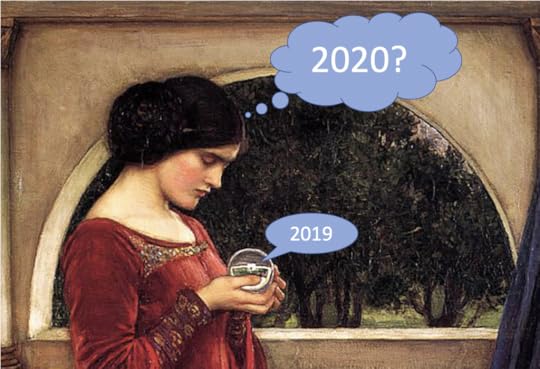
The choice above is one I pose at the end of a 20-minute audioblog I recorded for today, here it is in .mp4:
http://blogs.harvard.edu/doc/files/2020/07/2020_07_28_audioblog.m4a
And, if that fails, here it is in .mp3:
http://blogs.harvard.edu/doc/files/2020/07/2020_07_28_audioblog.mp3
The graphic represents the metaphor I use to frame that choice.
July 20, 2020
A rare sky treat
Across almost 73 laps around the Sun, I’ve seen six notable comets. The fifth was Hale-Bopp, which I blogged about here, along with details on the previous four, in 1997. The sixth is NEOWISE, and that’s it, above, shot with my iPhone 11. There are a couple other shots in that same album, taken with my Canon 5D Mark III. Those are sharper, but this one shows off better.
Hey, if the comet looks this good over the lights of Los Angeles, you might have a chance to see it wherever you are tonight. It’ll be under the Big Dipper in the western sky.
Every night it will be a bit dimmer and farther away, so catch it soon. Best view is starting about an hour after sunset.
July 15, 2020
How long will radio last?

These are among the since-demolished towers of the once-mighty WMEX/1510 radio in Boston.
The question on Quora was How long does a radio station last on average? Here is my answer, which also addresses the bigger question of what will happen to radio itself.
Radio station licenses will last as long as they have value to the owners—or that regulators allow them to persist. Call signs (aka call letters) come and go, as do fashions around them. (In the ’70s, the hot thing was using high-value scrabble letters: Z, Q and J.) But licenses are the broadcasting equivalent of real estate. And for now their value is holding up. But it won’t forever.
Arguing for persistence is the simple fact that nearly all the licenses ever issued, starting in the 1920s, are still in use, and still being renewed. So are a great majority of the many thousands of of new licenses issued over the near-century since then radio was born in the U.S.
But there are signs of rot, especially on the AM band, where many stations are shrinking—literally, with smaller signals and coverage areas—and some are dying. Four reasons for that:
FM and digital media sound much better. Electrical (and especially computer) noise also infects all but the strongest signals. And most modern radios, especially those in cars, suck at AM reception.
Syndicated national programming is crowding out the local kind. This is due both to consolidation of ownership in the hands of a few large companies (e.g. Entercom, Cumulus, iHeart) and the shift of advertising money away from local radio. The independent local AM (and even FM) station is in the same economic pickle as the independent local newspaper.
The value of real estate under many AM transmitters exceeds the value of the stations themselves. Even popular AM stations, such as WBBM/780 in Chicago, have moved to other sites with lesser signals, so they can sell off valuable land under their original towers. (Note that WBBM is still #1 in the Nielsen Ratings for Chicago at this writing, in July 2020.) A more typical example is KDWN/720, which used to be 50,000 watts day and night (the legal max), with a huge night signal reaching the whole West Coast. It recently moved to another station’s towers with just 25,000 watts by day and 7,500 watts at night. The owner did this so it could sell off the old transmitter site, which is (or was, if it has been sold by now) probably worth more than the station itself. (Here is a 2019 Google StreetView of the old site, with a For Sale sign.) Note also that KDWN now identifies as “101.5 FM / 720 AM – The Talk of Las Vegas .” Transmitting with 250 watts through its translator (K268CS on 101.5 FM) from atop The Strat (formerly the Stratosphpere) on The Strip, KDWN puts a good-enough FM signal to the heart of the Las Vegas metro. Its showing in the ratings likely owes to the FM signal. Today many AM stations exist only as an excuse to operate FM translators like this one.
In the Battle of the Bands, FM won. For evidence, look at the Nielsen Audio Ratings for the Washington DC region. Only two AMs show. One is WBQH/1050, a regional Mexican formatted station with an 0.2% share of listening and a signal that is only 44 watts at night. And most of the listening likely owes to the station’s 180-watt signal on 93.5fm. (That signal is from a translator, which is a low-power repeater signal.) The other station is WSBN/630am, a sports station with an 0.1% share: a number that couldn’t be lower without disappearing. That license was once WMAL, which sold off the land under its towers a few years ago, moving far out of town to “diplex” on the towers of yet another station that long ago sold the land under its original towers. That other station is now called WWRC/570. It’s a religious/conservative talker with no ratings that was once WGMS, famous in its glory years as a landmark classical station.
Despite this, the number of AM licenses in the U.S persist in the thousands, while the number of abandoned AM licenses number in the dozens. (The FCC’s Silent AM Broadcast Stations List is 83 stations long. The Silent FM Broadcast Stations List is longer, but includes a lot of translators and LPFMs, which I’ll explain shortly.) Also, neither list includes licenses that have been revoked or abandoned in the distant past, such as the once-legendary KISN in Portland, Oregon.)
What I’ve reported so far applies only to the U.S. AM band, which is called MW (for mediumwave) in most of the rest of the world. In a lot of that world, AM/MW is being regulated away: abandoned by decree. That’s why it is gone, or close to it, in some European countries. Canada has also scaled back on AM, with the CBC moving in many places exclusively to FM.
The news is less bad for FM, which has thrived since the 1970s, and now accounts for most over-the-air radio listening. The FCC has also done its best to expand the number of stations and signals on the FM band, especially in recent years through translators and LPFMs (low power FM stations, meant to serve a few zip codes at most). In Radio-Locator’s list of stations you’ll recieve in Las Vegas, 16 of the 59 listed signals are for translators and LPFMs. Meanwhile only 18 stations have listenable signals on AM, and some of those signals (such as KDWN’s) are smaller than they used to be.
Still, the effects of streaming and podcasting through the Internet will only increase. This is why so many stations, personalities, programming sources and station owners are rushing to put out as many streams and podcasts as possible. Today, every phone, pad and laptop is a receiver for every station with digital content of any kind, and there are many more entities competing for this “band” than radio stations alone.
While it’s possible that decades will pass before AM and FM are retired completely, it’s not hard to read the tea leaves. AM and FM are both gone now in Norway, which has switched to Digital Audio Broadcasting, or DAB, as has much of the rest of Europe. (We don’t have DAB in the U.S., and thus far there is very little interest in it.)
Still, I don’t doubt that many of entities we call “stations” will persist without signals. Last summer we listened to local radio from Santa Barbara (mostly KCLU) while driving around Spain, just by jacking a phone in to the dashboard and listening to Internet streams through the cellular data system. Even after all their transmitters get turned off, sometime in the far future, I’m sure KCLU will still be KCLU.
The process at work here is what the great media scholars Marshall McLuhan and his son Eric (in Laws of Media: The New Science) call retrieval. What they mean is that every new medium retrieves the content of what it obsolesces. So, much as print retrieved writing and TV retrieved radio, the Internet retrieves damn near everything it obsolesces, including TV, radio, print, speech and you-name-it.
In most cases the old medium doesn’t go away. But broadcasting might be different, because it exists by grace of regulation, meaning governments can make them disappear. The FCC has already done that to much of the UHF TV band, auctioning off the best channels to cellular systems. This is why, for example, T-Mobile can brag about their new long-range “5G” coverage. They’re getting that coverage that over what used to be UHF TV channels that stations auctioned away. It’s also why, for example, when you watch KLCS, channel 58 in Los Angeles, you’re actually watching channel 28, which the station shares with KCET, using the same site and transmitter. The Los Angeles Unified School District collected a cool $130,510,880 in a spectrum auction for channel 58.
So, when listening to the AM and FM bands drops sufficiently, don’t assume the FCC won’t say, “Hey, all the stations that matter are streaming and podcasting on the Internet, so we’re going to follow the path of Norway.” When that happens, your AM and FM radios will be as useful as the heavy old TVs you hauled out to the curbside a decade ago.
Additional reading: The slow sidelining of over-the-air radio and AM radio declared dead by BMW and Disney .
July 13, 2020
Home is where one’s butt is
I don’t want to explain why we’re bivouac’d at a friend’s house in San Marino. What matters, for the purpose of this post, is that we wouldn’t be here if it weren’t for the Covid-19 pandemic.
But hey, it’s a nice house in a nice town. My only complaint is that there’s nothing resembling an office desk or chair here. I’ve coped by collecting my ass and my electronics within an arrangement of mostly antique furniture. That’s what you see in the screenshot above. (From my most recent Floss Weekly podcast.) The rest of the house looks kinda like the set of Knives Out.
I start with this setting because a friend asked me to write my own version of what Francine @Hardaway published today in Releasing My Former Life. (It’s a good piece. Go read it. I also thank Francine for turning me on to #Clubhouse. It is reportedly invite-only and apparently website-less, but I’m hoping she or a reader can get me one. Or two.)
So, what to report?
Well, in pre-pandemic times my wife and I were on the road at least a third of the time, so we’re used to operating out of hotel rooms, conference spaces and seats by the gates of departing flights at airports. So living in places other than home is not odd for us. It is odd to go around wearing masks in public while keeping our distance, as if everyone had just farted; but we hardly go out at all. We provision the kitchen here with runs to Trader Joe’s or Costco on days when they open early for geezers, and that only happens every couple weeks or so. Also, this region isn’t one of those in denial of the pandemic. People here tend to have Fauci-compliant public health practices.
In the early mornings or late evenings, when it’s not 95° outside, I do venture out for walks of 2-3 miles or more in the neighborhood. The roads are wide here, and the pedestrian traffic is light, so I leave the mask off most of the time. There are also lots of amazing trees and gardens, so I’ll pause to admire those and post occasional photos of interesting stuff on Instagram. (This kind of thing, by the way, comprises almost my entire experience of Instagram.)
While paying work has taken a hit, I remain overcommitted to all the obligations I had before the pandemic arrived, plus a couple new ones, such as the Floss Weekly podcast. It bothers me that I’m not as efficient or as effective in that work as I’d like, but being bothered about it isn’t the same as being depressed or anxious. It just kinda sucks.
Other stuff…
Dorothy Parker said (or is said to have said) that she preferred the company of younger men “because their stories are shorter.” I am mindful of that. I also know it’s way too easy to talk about infirmities that accumulate, lengthen and get more complicated with age. So I avoid writing, thinking or talking about being old, even though it keeps me up at night, mostly because I have to pee.
I’m optimistic about the long-run future, though the short run will surely get worse before it gets better. (Bad things happen when people die at wartime rates and large hunks of the economy are turned off.) I could say more about that, but I won’t, because—
There is far more than enough political writing and talk. Sure, I fantasize about speaking up, because I do think I have some useful things to say. I just don’t expect what I say to make a bit of difference. The noise level is so high right now, and the effect level of any given tweet or post is so low, that I’m disinclined to say much. Add that to what I said here in 2014 and here two months ago, and you’ll see why I’d mostly rather work on other stuff.
The main thing for me right now is Customer Commons. If it succeeds, it will be the most leveraged thing I’ve ever done, meaning the best for the world. If you’re interested in helping, drop me an email. First name at last name dot com. Thanks.
July 12, 2020
How to get fans inside the NBA’s playoff bubble

Sell tickets to attend online through Zoom, Microsoft Teams, Google Hangouts, Webex, GoToMeeting, Jitsi or whatever conferencing system can supply working tech to the NBA. Then mic everyone in the paying crowd, project them all on the walls (or sheets hanging from the ceiling), combine their audio, and run it through speakers so players can see and hear the cheering crowds.
The playoffs start on July 31. That’s not much time to prepare, but there’s money in it for the NBA and the companies it hires to pull this off. And hey, the Disney folk should be up for doing something that’s this creative and fun. (And think of all the games within games that might also be played here. Also all the other sports where this can also work.)
Since the conferencing systems of the world are already very competitive, sports reporters can cover service selection as the playoff before the playoff.
Obviously Zoom is the one to beat (since so many of us already use it), but Microsoft Teams just said a bunch of stuff that makes me think they could pull this one off. (I’d also like to thank them for the imagery I used in the photo above. Also Downtown. Hope ya’ll don’t mind.) Google has immensity to leverage. Jitsi has a hearty open source dev community. As for the others, here’s your chance to leapfrog the leaders. Or yourselves. The PR will be immense.
What matters is that this can be done. Hell, we’re talking about tech here. Anything can be done with tech.
So let’s do it. Get fans on the walls of the bubble.
July 10, 2020
The Future of Now
 There is latency to everything. Stub your toe and a second or two passes before the pain kicks in. The crack of a bat on a playing field takes half a second before it reaches the ears of the watching crowd. The sunlight we see on Earth is eight minutes old. Most of this doesn’t matter to us, or if it does we adjust to it.
There is latency to everything. Stub your toe and a second or two passes before the pain kicks in. The crack of a bat on a playing field takes half a second before it reaches the ears of the watching crowd. The sunlight we see on Earth is eight minutes old. Most of this doesn’t matter to us, or if it does we adjust to it.
Likewise with how we adjust to the inverse square law. Never mind what it says. What it means is that the farther away something is, the smaller it looks or the fainter it sounds. How much smaller or fainter is something we intuit more than we calculate. What matters is that we understand the law with our bodies. In fact we understand pretty much everything with our bodies.
Consider how we grasp, catch, toss around, or throw away an idea. Or how all of the prepositions we use pertain to location or movement: over, under, around, through, with, beside, within, alongside, on, off, above, below. There are only a few dozen of these, and all make sense because we are embodied beings.
So how are we to make full sense of the Web, or the Internet, where we are hardly embodied at all?
Think about it. We may say we are on the Web, but in fact we are only looking at it. And, while we do that, neither latency nor the inverse square law especially apply. Nor does our experience of either.
This week at Web Science 20, I have been present with people all over the world, with no sense that there is any meaningful distance between us, except maybe when a connection fails. Even then, we’re usually not sure if what’s to blame is somewhere else in the world or on our own connection. Joyce (my wife, who is also the source of much wisdom for which her husband gets the credit) says our experience on the Web is one of absent distance and gravity—and that this experience is still so new to us that we have only begun to make full sense of it as embodied creatures. We’ll adjust, she says, much as astronauts adjust to the absence of gravity. But this will take more time than we’ve had so far.
I bring this up because in a few hours I’ll be on the closing panel of the conference, titled The Future of Web Science. I’m not sure what I’ll say or how much time I’ll be given to say it, but I am sure I have enough time and space right now to write down some of my thoughts in advance, some of which are informed by earlier sessions at the conference, all of which have been excellent.
My first thought is the one I just introduced: The Web, like the Net it runs on, is both new and utterly vexing toward understanding in terms we’ve developed for making sense of embodied existence.
Here are some more.
The Web is a whiteboard.
In the beginning we thought of the Web as something of a library, mostly because it was comprised of sites with addresses and pages that were authored, published, syndicated, browsed and read. A universal resource locator, better known as a URL, would lead us through what an operating system calls a path or a directory, much as a card catalog did before library systems went digital. It also helped that we understood the Web as real estate, with sites and domains that one owned and others could visit.
The metaphor of the Web as a library, though useful, also misdirects our attention and understanding away from its nature as collection of temporary manifestations. Because, for all we attempt to give the Web a sense of permanence, it is evanescent, temporary, ephemeral. We write and publish there as we might on snow, sand or a whiteboard. Even the websites we are said to “own” are in fact only rented. Fail to pay the registrar and off it goes.
The Web is not what’s on it.
It is not Google, or Facebook, dot-anything or dot-anybody. It is the manifestation of documents and other non-stuff we call “content,” presented to us in browsers and whatever else we invent to see and deal with what the hypertext protocol makes possible. Here is how David Weinberger and I put it in World of Ends, more than seventeen years ago:
1. The Internet isn’t complicated
2. The Internet isn’t a thing. It’s an agreement.
3. The Internet is stupid.
4. Adding value to the Internet lowers its value.
5. All the Internet’s value grows on its edges.
6. Money moves to the suburbs.
7. The end of the world? Nah, the world of ends.
8. The Internet’s three virtues:
a. No one owns it
b. Everyone can use it
c. Anyone can improve it
9. If the Internet is so simple, why have so many been so boneheaded about it?
10. Some mistakes we can stop making already
That was a follow-up of sorts to The Cluetrain Manifesto, which we co-wrote with two other guys four years earlier. We followed up both five years ago with an appendix to Cluetrain called New Clues. While I doubt we’d say any of that stuff the same ways today, the heart of it beats the same.
The Web is free.
The online advertising industry likes to claim the “free Internet” is a grace of advertising that is “relevant,” “personalized,” “interest-based,” “interactive” and other adjectives that misdirect us away from what those forms of advertising actually do, which is track us like marked animals.
That claim, of course, is bullshit. Here’s what Harry Frankfurt says about that in his canonical work, On Bullshit (Cambridge University Press, 1988): “The realms of advertising and public relations, and the nowadays closely related realm of politics, are replete with instances of bullshit so unmitigated that they can serve among the most indisputable and classic paradigms of the concept.” Boiled down, bullshit is what Wikipedia (at the moment, itsef being evanescent) calls “speech intended to persuade without regard for truth.” Another distinction: “The liar cares about the truth and attempts to hide it; the bullshitter doesn’t care if what they say is true or false, but rather only cares whether their listener is persuaded.”
Consider for a moment Win Bigly: Persuasion in a World Where Facts Don’t Matter, a 2017 book by Scott Adams that explains, among other things, how a certain U.S. tycoon got his ass elected President. The world Scott’s talks about is the Web.
Nothing in the history of invention is more supportive of bullshit than the Web. Nor is anything more supportive of truth-telling, education and damned near everything else one can do in the civilized world. And we’re only beginning to discover and make sense of all those possibilities.
We’re all digital now
Meaning not just physical. This is what’s new, not just to human experience, but to human existence.
Marshall McLuhan calls our technologies, including our media, extensions of our bodily selves. Consider how, when you ride a bike or drive a car, those are my wheels and my brakes. Our senses extend outward to suffuse our tools and other technologies, making them parts of our larger selves. Michael Polanyi called this process indwelling.
Think about how, although we are not really on or through the Web, we do dwell in it when we read, write, speak, watch and perform there. That is what I am doing right now, while I type what I see on a screen in San Marino, California, as a machine, presumably in Cambridge, Massachusetts, records my keystrokes and presents them back to me, and now you are reading it, somewhere else in (or on, or choose your preposition) the world. Dwell may be the best verb for what each of us are doing in the non-here we all co-occupy in this novel (to the physical world) non-place and times.
McLuhan also said media revolutions are formal causes. Meaning that they form us. (He got that one from Aristotle.) In different ways we were formed and re-formed by speech, writing, printing, and radio and television broadcasting.
I submit that we are far more formed by digital technologies, and especially by the Internet and the Web, than by any other prior technical revolution. (A friend calls our current revolution “the biggest thing since oxygenation.”)
But this is hard to see because, as McLuhan puts it, every one of these major revolutions becomes a ground on which everything else dances as figures. But it is essential to recognize that the figures are not the ground. This, I suggest, is the biggest challenge for Web Science.
It’s damned hard to study ground-level formal causes such as digital tech, the Net and the Web. Because what they are technically is not what they do formally. They are rising tides that float all boats, in oblivity to the boats themselves.
I could say more, and I’m sure I will; but I want to get this much out there before the panel.
July 4, 2020
Coming From Every Here
To answer the question Where are SiriusXM radio stations broadcasted from?, I replied,
If you’re wondering where they transmit from, it’s a mix.
SiriusXM transmits primarily from a number of satellites placed in geostationary orbit, 35,786 kilometres or 22,236 miles above the equator. From Earth they appear to be stationary. Two of the XM satellites, for example, are at 82° and 115° West. That’s roughly aligned with Cincinnati and Las Vegas, though the satellites are actually directly above points along the equator in the Pacific Ocean. To appear stationary in the sky, they must travel in orbit around the Earth at speeds that look like this:
3.07 kilometres or 1.91 miles per second
110,52 kilometres or 6,876 miles per hour
265,248 kilometres or 165,025 miles per dayEarlier Sirius satellites flew long elliptical geosynchronous orbits on the “tundra“ model, taking turns diving low across North America and out into space again.
Satellites are also supplemented by ground repeaters. If you are in or near a site with repeaters, your Sirius or XM radio may be tuned to either or both a transmitter in space or one on the ground nearby. See DogstarRadio.com’s Satellite and Repeater Map to see if there is one near you.
In addition, SiriusXM also streams over the Internet. You can subscribe to radio, streaming or both.
As for studios, those are in central corporate locations; but these days, thanks to COVID-19, many shows are produced at hosts’ homes. Such is the case, for example, with SiriusXM’s popular Howard Stern show.
So, to sum up, you might say SiriusXM’s channels and shows are broadcast from everywhere.
I should add that I’ve been a SiriusXM subscriber almost from the start (with Sirius), and have owned two Sirius radios. The last one I used only once, in August of 2017, when my son and I drove a rental minivan from Santa Barbara to Love Ranch in central Wyoming, where we watched the solar eclipse. After that it went into a box. I still listen a lot to SiriusXM, almost entirely on the phone app. The rest of my listening is over the Web, logged in through a browser.
Item: a few days ago I discovered that a large bill from SiriusXM was due to a subscription for both the radio and the Internet stream. So I called in and canceled the radio. The subscription got a lot cheaper.
I bring this up because I think SiriusXM is a single example of a transition going on within the infrastructure of what we still call radio, but instead we would call streaming if we started from scratch today. We would call it streaming because that’s how broadcasting looks like on the Internet. And the Internet is subsuming and gradually replacing over-the-air radio with what for most purposes is a better system. When it’s done, most or all of over-the-air radio will be gone.
In The Intention Economy (Harvard Business Review Press, 2012), I saw this future for what we wouldn’t call television if we started that one from scratch today (or even when this was published, eight years ago):
Today we’d put Netflix, Amazon Prime, YouTube TV and Apple TV in the upper left (along with legacy premium cable staples, such as HBO and Showtime). We’d put PBS stations there too, since those became subscription services after the digital transition in 2008 and subsequent spectrum sales, which reduced over-the-air TV to a way for stations to maintain their must-carry status on cable systems. (Multiple “repacks” of TV stations on new non-auctioned channels have required frequent “re-scans” of signals on TVs of people who still want to watch TV the old-fashioned way and hook up an antenna.)
While over-the-air radio has been terminal for years, its death has been less hastened by regulatory changes to satisfy the need for more data-friendly frequencies (which TV has, and radio doesn’t). Here’s the diagnosis I published in 2016. I’ve also been keeping a photographic chronicle of radio in hospice, over on my Flickr account for Infrastructure. A touching example of one station’s demise is Abandoned America’s post on the forgotten but (then) still extant studios of WFBR (1924-1990) in Baltimore.
The main difference with radio is that it still wants to be free.
Want to have some fun with that? Go to RadioGarden and look around the globe at free streams from everywhere. My own current fave is little CJUC in Whitehorse, Yukon. (I list others here.) All of those are what we say is “on” the Internet. But where is that?
We can pinpoint sources in the physical world, as RadioGarden does, on a globe; but the Internet defies prepositions, because there is no “there” there. There is only here, where we are now, in this non-place with no distance and no gravity because its nature is to defy both, leaving those up to the individual. I’m in Santa Barbara right now, but could be anywhere. So could you.
On the Internet, over-the-air TV and radio are anachronisms, though charming ones. Like right now, as I’m listening to Capricorn FM from Polokwane, South Africa. (“Crazy up-tempo hip-hop” is the fare.) But I’m not listening on a radio, which would require tuning to 89.9fm somewhere within range of the station’s transmitter. I’m here, on (or in, or through, or pick-your-preposition) the Internet.
A few years ago my then-15-year-old son asked me what the point of “range” and “coverage” was for radio stations. Why, he wondered, were those features rather than bugs? Meaning why is it okay for a station to fade away as you drive out of town?
His frame of reference, of course, was the Internet. Not the terrestrial world where distance and the inverse square law apply.
Of course, we will always live in the terrestrial world. The Internet may go away, or get fractured into regions so telecom companies can bill for crossing borders and governments can limit what’s accessible within those borders. But the Internet is also an infrastructural genie that is not going back in the bottle. And it is granting many wishes, all in a new here. It exists in the manner of a natural law, such as we have with gravity in the physical world.
And I submit that we are still only starting to understand it. (For how we’re only starting, see here.)
This post first appeared in a sister blog, Trunk Line.
June 28, 2020
Audio blog #2

http://blogs.harvard.edu/doc/files/2020/06/2020_06_27_digital.mp3
Yesterday’s audio blog post (again, not a podcast—I already do two of those) had 81 visits during that day and another couple dozen this morning. It also got one response on Facebook, a few on Twitter and a couple by email and other channels. Two responses were to the substance of the post, and one addressed the issue of recording while walking. Which I admit was an issue. Two people walking together can tolerate the other one panting a bit, but on headphones (or even speakers) it’s a chore to listen.
But the response I got was sufficiently encouraging for me to do one more.
I recorded this one last night while walking, before I got the feedback this morning about problems with doing that. So this time, in addition to converting the file to .mp3, I went through it and cut out as much panting as I could. If I continue doing this, I’ll do it while sitting or standing still.
Again, this is an experiment in communication. At issue is whether it’s more worthwhile to talk to people or to write to them. The subjects of yesterday’s post and today’s are topics I’ve written about already. I’m not linking to them here because I want to see if talking in some way outperforms writing. If it does, I’ll keep it up. If not, I’ll keep talking anyway, most mostly not here. And, of course, I’ll keep writing as well, because that’s what I do. So here ya go.
Doc Searls's Blog
- Doc Searls's profile
- 11 followers


